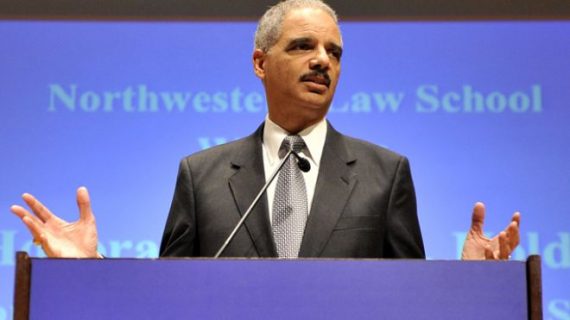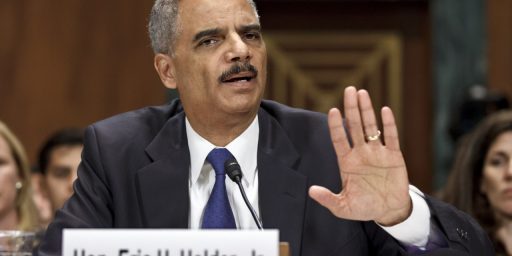Eric Holder: Yes, We Can Kill American Citizens Without Trial
Attorney General Eric Holder offered a somewhat alarming defense of the Administration's policy on targeted killings.
In the wake of the death of Anwar al-Awlaki in a drone strike in Yemen last year, there’s been a growing debate over the propriety, and legality, of the power asserted by the Obama Administration in connection with the mission that the President could designate an American citizen for targeting without any due process. Yesterday, in a speech in Chicago, Attorney General Eric Holder justified the new doctrine:
WASHINGTON — Attorney General Eric H. Holder Jr. asserted on Monday that it is lawful for the government to kill American citizens if officials deem them to be operational leaders of Al Qaeda who are planning attacks on the United States and if capturing them alive is not feasible.
“Given the nature of how terrorists act and where they tend to hide, it may not always be feasible to capture a United States citizen terrorist who presents an imminent threat of violent attack,” Mr. Holder said in a speech at Northwestern University’s law school. “In that case, our government has the clear authority to defend the United States with lethal force.”
While Mr. Holder is not the first administration official to address the targeted killing of citizens — the Pentagon’s general counsel, Jeh Johnson, did so last month at Yale Law School, for example — it was notable for the nation’s top law enforcement official to declare that it is constitutional for the government to kill citizens without any judicial review under certain circumstances. Mr. Holder’s remarks about the targeted killing of United States citizens were a centerpiece of a speech describing legal principles behind the Obama administration’s counterterrorism policies.
“Some have argued that the president is required to get permission from a federal court before taking action against a United States citizen who is a senior operational leader of Al Qaeda or associated forces,” Mr. Holder said. “This is simply not accurate. ‘Due process’ and ‘judicial process’ are not one and the same, particularly when it comes to national security. The Constitution guarantees due process, not judicial process.”
This is both accurate and utterly incompletely. Yes, it’s true that the Constitution — specifically in this case the 5th Amendment — does not specifically require judicial hearings in all cases. However, throughout the history of the United States and, indeed the Common Law tradition in England from which our law largely originates, the idea of due process and a hearing before an impartial tribunal have gone hand in hand. That’s where things like the Writ of Habeus Corpus, known in English Law as the Great Writ, comes from. Once the courts in England had the authority to demand that anyone being held by brought before them and the Crown explain why they were being held, the ability of the King to hold people indefinitely, or to try them in secret came to an end. Now, here we are some 900 years after the Magna Carta, and the chief law enforcement officer of the United States is essentially suggesting that an American President can sentence an American citizen to death via nothing more than a committee meeting in some windowless room in the White House. Is that really due process? It certainly doesn’t seem like it to me.
Here’s how Holder explained this “review process” in the speech:
Let me be clear: an operation using lethal force in a foreign country, targeted against a U.S. citizen who is a senior operational leader of al Qaeda or associated forces, and who is actively engaged in planning to kill Americans, would be lawful at least in the following circumstances: First, the U.S. government has determined, after a thorough and careful review, that the individual poses an imminent threat of violent attack against the United States; second, capture is not feasible; and third, the operation would be conducted in a manner consistent with applicable law of war principles.
Bernard Finel reminds us all of the Star Chamber, and then asks:
How is our current scheme for targeted killings any different? State murder of political enemies on the basis of secret memos. That is the very essence of the Star Chamber, and the precise reason why that practice became a symbol of tyranny.
Look, I get that there are bad guys out there. And indeed, we may need to kill them on occasion. But why not have a public process? Why not require indictments and trials in absentia. Why not have judicial review?
Yes, the Star Chamber model is quicker. But since when is that the determinative principle on issues that confront fundamental questions of democratic governance and civil liberties?
This is a question I have been asking ever since the Obama Administration announced that the President had in fact placed al-Awlaki on a target list. When relatives of his in the United States, along with the American Civil Liberties Union, attempted to get a Court to intervene in the matter, they were unsurprisingly rebuffed and, after the murder took place (and yes, it was a murder) the Administration refused to release even a redacted copy of the legal memo that was supposedly prepared by Justice Department lawyers to justify this action. To this day, they still refuse to release that document. The American people, it seems, are to be denied the right to know how their government justifies granting the President of the United States once claimed by the Kings we overthrew when we became a nation. No, I take that back,. Even George III didn’t have the kind of authority that the Administration is asserting here, or at least he lived in an era where standards of propriety prevented it from ever even being considered.
Glenn Greenwald, in a must-read piece, nails it:
The most important point to note for this entire debate is how perverse and warped it is that we’re even having this “debate” at all. It should be self-negating — self-marginalizing — to assert that the President, acting with no checks or transparency, can order American citizens executed far from any battlefield and without any opportunity even to know about, let alone rebut, the accusations. That this policy is being implemented and defended by the very same political party that spent the last decade so vocally and opportunistically objecting to far less extreme powers makes it all the more repellent. That fact also makes it all the more dangerous, because — as one can see — the fact that it is a Democratic President doing it, and Democratic Party officials justifying it, means that it’s much easier to normalize: very few of the Party’s followers, especially in an election year, are willing to make much of a fuss about it at all.
And thus will presidential assassination powers be entrenched as bipartisan consensus for at least a generation. That will undoubtedly be one of the most significant aspects of the Obama legacy. Let no Democrat who is now supportive or even silent be heard to object when the next Republican President exercises this power in ways that they dislike.
That’s really the most important point of all. If there’s one thing that history has taught us about these assumptions of power by the Presidency it’s that, once assumed they are never retracted. For all of the Democratic Party’s criticism of manner in which the Bush Administration asserted powers for itself while conducting the War On Terror and the Iraq War, the Obama Administration has not foresworn any of those assertions of power. Indeed, on more than one occasion, the Obama White House has relied upon legal arguments developed during the Bush Administration, including the so-called “state secrets” doctrine, which it has used to block more than a few efforts to bring judicial review to Presidential decision making in this area. Do not doubt that whoever succeeds Barack Obama, whether that occurs in January 2013 or January 2017, will continue to assert that they too have the authority to target people for killing based on secret proceedings using secret evidence and conducted wholly outside public view? Once again, we’ve let a President open Pandora’s Box and nobody knows what might come out.






And you believed it would be different?
@Idiot:
I certainly did not.
Given the recent discussion of what is an “imminent” threat to justify (some views) on the legality of invading Iran in self-defense, it is interesting that Holder is similarly using an “imminence” concept that is probably likelwise rooted in self-defense.
To me, its more likely that a state, either directly or through sponsorship of terrorism, can pose an “imminent” threat to the United States than any given individual.
Well. I guess we owe Bush an apology. If it’s ok for the president to order executions, then it must be ok for him to order illegal wiretapping, torture and indefinite detention.
Greenwald: ….”no checks or transparency”
Beg to differ, Glen, that list was public. If more transparency is desired, it’s up to Congress to demand it. They did not. How much more do you want?
Let’s stop pretending this gives the power to the President to assassinate US citizens in a whim. Let’s make sure that doesn’t happen, of course, but the hyperbole is unhelpful.
There are exceptional circumstances that crop up from time to time. Here, we had a guy hiding among the tribesman of Yemen training kids to bomb airliners. Shall we arrest him? Certainly. Yet, how many soldiers are you willing to sacrifice for this POS? How many Yemeni “collateral damage”, as we call the deaths of non-US Lucky Sperm Clubbers? There are practical considerations.
It’s most unfortunate. I would certainly support the founding of special institutions for such incidents, should they become more than one-or-two offs. I believe the administration did the right things here in the absence of the above. They made it public. The man had an obligation as being a US citizen to lawyer-up and defend himself. He did not. If you are going to make it so difficult to arrest you alive that many “LE officers” and innocent bystanders must die, then we will kill you, just like we do Americans on the street here. Let’s stop pretending something reeeeelly eerie happened in Yemen.
The State Secrets privilege goes back to 1953. (And is based on a lie.)
Excellent decision by Team Obama.
If a U.S. citizen joins al Qaeda and is waging against the U.S. either war or terrorism from abroad there’s no reason whatsoever to provide them with any legal protections. By definition they’ve renounced all privileges and immunities of citizenship. Throughout recorded history criminals are tried but traitors on the battlefield summarily are executed. End of story.
Generally speaking Holder arguably is the worst AG ever. On this particular topic, however, he’s 100% correct. Kudos to Team Obama for having the cojones not to bow to pressure on this topic from the loopy left.
This is one where I totally agree with you Doug. I didn’t agree with this philosophy when Bush was president and I don’t agree with it now when Obama is president. The president of the US shouldn’t have the power to whack anyone he wants on some grounds that his own administration makes up. It’s a slippery slope that opens the door to state sponsored terrorism by anyone. In the good old days of the Soviet Union they used to whack people who they perceived as enemies and everyone used to get outraged about their recklessness, and Israel has been doing it for years with barely a peep. We shouldn’t be surprised if when others start using the tactic no one takes our outrage very seriously.
The question is simple. Either we should use drones and other military means to kill terrorists around the world or we shouldn’t. That Terrorist A is a Saudi in Yemen and Terrorist B is an American in Yemen doesn’t make a lick of difference. I think we probably need to have a very long and involved discussion about this strategy, but that won’t ever happen as long as self-righteous douches like Greenwald keep carrying on as those we’re talking as if some guy was minding his own business on a Brooklyn street corner when Obama rolled up in the Presidential limo and did a drive by.
Mike
@Dazedandconfused:
Oh? You know who’s on the death list then? And the idea I as a citizen have no right to demand transparency, that only Congress had that right, is the definition of an authoritarian mindset. The President and his people are dead wrong on this. End of story.
@MBunge: You don’t know “Terrorist B” is a terrorist, do you? Your entire argument is based on the logical fallacy that somehow the government is always right when it accuses someone of being an enemy of the state (forget that progressives consistently argue we shouldn’t have a death penaly because mistakes are too easy).
Forgive me if I don’t take a president’s word for it.
I am disheartened by this claim, of course. And by the so-called-Patriot Act and the State Secrets precedent that others have mentioned. I suppose if one sits in the Oval Office or visits it fairly frequently it must make sense to someone who is otherwise a good person serving — and here is REALLY a case of “both sides do it” — both Repub and Dem administrations.
But the way our republic is intended to work is for a huge roar to come from Congress that “checks” the President. For that to happen, the roar must be led by the opposing party. Because the President’s party is not so likely to be a “check”.
We know how likely it is that the so-called-conservatives will perform that duty, don’t we. Such is the loss to real democracy caused by the degradation of the once-great Republican Party.
@Ben Wolf:
I have no problem with citizens demanding more either, Ben. That list was out there 6 months.
We have no established set of laws for this sort of thing, so Holder is of course left without a reasonable explanation. What, IYO, should we and he have done? Exactly?
Yemen’s “government” held firm control of but roughly 6 square blocks of Saana. That was about it.
@MBunge:
You’re endorsing the iron law of emulation. So don’t come whining when some state sponsored terrorist group makes an attack on someone or something outside it’s own territory. It may be frustrating but if we expect others to abide by rules of restraint and due process we’d better adhere to them ourselves.
@Dazedandconfused:
We should comply with the Constitution and present evidence in court as to an accused “terrorist’s” guilt. If the administration knows for a fact that an american has taken up arms against his own country then it should have total confidence in its ability to win at trial. No individual can be of such tremendous threat to this country that his death can’t wait.
@Ben Wolf: I don’t know if you were aware, but Saddam Hussein was tried and found liable for 9/11 in abstentia. If you are going to create a trial requirement, you are immediately going to run into the problem that the accussed will not be present; does it matter? If it doesn’t matter, I’m not sure the protections of a trial will mean much. If it does matter, there won’t be any trial.
@Ben Wolf:
Trials in absentia? Not my favorite. They violate the right of the accused to challenge their accusers. I guess having a judge involved is better than nothing. Myself, the public admission and a period of time for people to challenge such actions is plenty.
Does this establish guilt beyond a reasonable doubt? No chance, but OK. Let’s demand trials in absentia for US citizens hiding abroad before any action can be taken against them.
You can make up all the legal hocus pocus you like guys but do you really think claims of trials in absentia are going to have any impact whatsoever with either the street or regimes that want cover for their own acts of state sponsored terrorism.
Listen to what is being said here: we might not get the right verdict from a trial, so we shouldn’t have one. al-Awlaki was never even given the chance to return home to defend himself in court. The Constitution requires he have the opportunity to defend himself, it requires he have a trial. If you think that should be ignored then at least say so.
@Dazedandconfused: I’ll agree with most of that, as there needs to be a judge involved or a trial of some kind. And Congress is really being amazingly spineless by not dealing with this issue.
Since some folks seem to not get my point…
If it’s okay and appropriate for the President to launch a drone attack to kill a Saudi-born alleged terrorist in Yemen or Afghanistan or wherever, it’s okay and appropriate for the President to take the same action against an American-born alleged terrorist. If it’s not okay or appropriate to do this to Americans, then it’s not okay for anybody. The idea that it’s fine to launch a military strike on Suspect A because he was born in Egypt but completely wrong to launch a strike on Suspect B because he was born in Iowa, even if the evidence is exactly the same in both cases, is bullshit. It’s bullshit logically, ethically and I’m pretty sure it’s bullshit legally.
Most importantly, though, you’re never going to win the argument that the President’s hands are tied when it comes to defending the country because of a birth certificate. There are very strong moral and practical arguments against the use of military force in non-battlefield situations. “It’s okay unless it involves an American” is not one of them.
Mike
@Ben Wolf: “Listen to what is being said here: we might not get the right verdict from a trial, so we shouldn’t have one. ”
I don’t hear anybody saying that. At least what I’m saying is that a trial in which a person will not voluntarily submit him/herself to a judicial determination is going to be a sham affair. Why bother?
One of Doug’s points needs emphasizing:
The founders were not interested in the affairs of oversees adventurers, they wanted domestic security and a check on military expenditures. If you don’t like the policy, its not a Constitutional issue, its an issue of whom you elect.
You can call Obama a hypocrite, but based upon what can be gathered about him, I don’t think he is using his discretion in this matter without judgment.
@David M:
Thanks. I tend to view that as giving a judge the right to sign a death warrant, and one who has been presented with only a single side of the case. Such a proceeding seems to me little more than an empty formality. However, should the problem of US citizens as terrorists hiding out within lawless tribes in ungoverned lands become more than extremely rare, I quite agree there needs to be a system created within the legal branch to oversee it.
Anybody know of one that exists now to do such a thing? I reject the argument that the lack of one means that we must do nothing with someone who is strapping bombs on kids and sending them off with a slap on the butt and a “Go get em, Tiger”, should they be technically “US Citizens”. Or alternatively, create military campaigns to take them alive regardless of the cost. That we do not afford suspected criminals here.
“Once again, we’ve let a President open Pandora’s Box and nobody knows what might come out.”
This may be true, Doug. I asked my daughter if I converted to Islam, left the country, joined Al Quaeda and, for all intents and purposes, waged war on the U.S., would I have due process rights as a citizen. Her gut answer? “No, you’re a traitor. You’re not in the U.S. and you’re warring against your own country! You don’t have any rights!”
Some things are nuanced and some things are common sense. My 2-cent opinion is that al-Awlaki was a traitor waging war against the U.S. with a terrorist group that attacked us; consequently, his life was forfeit.
@Tsar Nicholas II:
Though I agree with your conclusion, we really have to stop name calling. Doug, for sure, is not a part of your “loopy left.” His comments are thought-out and reasoned, no matter if we agree or disagree with them. Serious people have serious concerns about the direction and tilt of our nation, starting with that Patriot Act, of which I was initially in support, shamefully. Reasoned arguments and discussion, reading different viewpoints and staying informed changed my position. AS I said, some things are nuanced, and some things are common sense.
Wasn’t that John Wilkes Booth guy hunted down and killed without a trial? I am certainly not defending Booth at all; this could have been part of an effort to make sure that he did not talk.
Who or what authority is responsible for making the decision as to which of our enemies are snatched for interrogation vs. killed out right?
Well, no one said the Constitution of the United States of America applied to every damn person in the world, now did they?
I understand the practical issue, but our laws mostly apply only to American citizens. The dude born in Iowa is an American citizen, and our law applies to him.
The great problem of our times. President goes to war without Congressional approval? Eh, we’ll pass a nonbinding resolution expressing dismay. He’ll be shamed into agreeing with us. Oh, he ignores us? Well, what can we do?
The real danger of Congressional polarization is their inability to unite against the Executive, regardless of what party holds the Executive.
@Tillman: That actually is one of the “both sides do it”, as they could do something if they wanted to act as a check on the executive branch. However, it appears they might see their shadow and are much more worried about that.
I think this is dangerous. I can construct an argument for why it’s being done, but ultimately I don’t think the payoff is worth the danger to ourselves. This is a double-edged sword with the nasty, rusty, serrated edge pointed toward ourselves.
Do we really want to bring someone like this into the country to stand trial and risk putting them before some soft on crime judge that cares more about the rights of criminals than the suffering of the victims? Do we want to risk them getting off on some technicality even though they are clearly guilty and then have them out roaming the streets looking for more victims?
@Lomax: Yes, yes we do. At least when he gets off, the evidence will be clear as day to anyone who cares to look upon the trial. Let the laws be changed afterward, certainly, but we need to actually learn from our mistakes instead of trying to extralegally circumvent them. Such behavior betrays apostasy from our founding ideals.
Are we so gullible and fearful that we actually trust any administration to determine who the bad guys are and thus bypass any democratic process? Would you really assume that simply because the president says he needs to take out this person that it is in fact for the reason stated and the reason is true?
Hitler didn’t come to power over night. Fascism happens one piece of repressive legislation at a time, one abuse of power that goes unchecked at a time. Those unaffected personally may not even recognize a fascist state while living under its rule. But ultimately it gets very, very ugly for the masses.
That crackling sound is our Constitution going up in flames.
As much as I believe that we should be protected and should go and get ‘that’ bad guy, there’s a huge difference here. There is a reason for ‘due process’. If we were to start making exceptions, particularly exceptions that are made by the ‘state’ we then spit in the face of our constitution.
We have other means to capture these guys. We should stop pussy footing around in this war against terrorism and start getting serious. We need to do targeted captures and bring them over here for trial.
Citizenship is very precious and once granted (either by birth or naturalization), NO ONE should be able to deny the rights to that person.
At what point do we say enough is enough, or who is to control the fine line here. After all the bill of rights was written to protect the citizens against the force of the state.